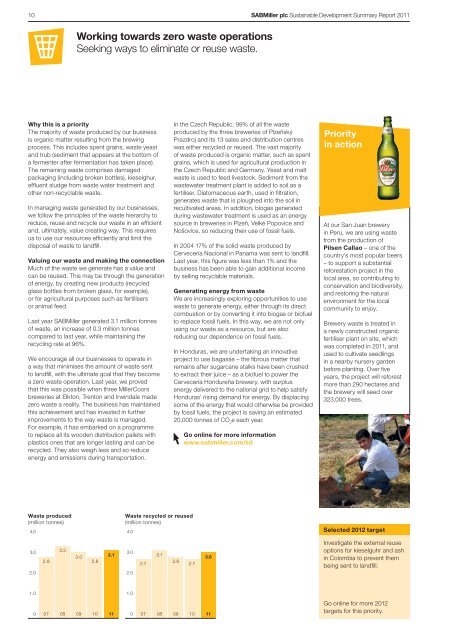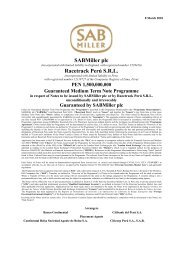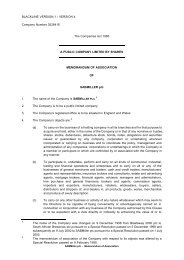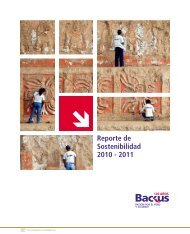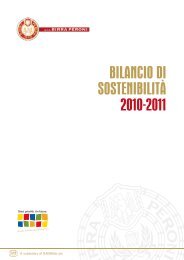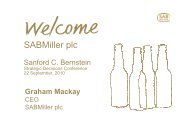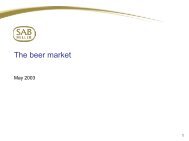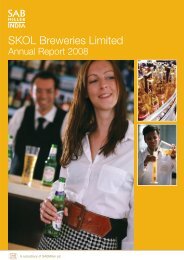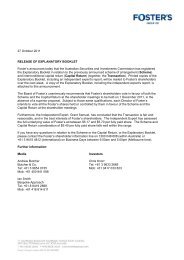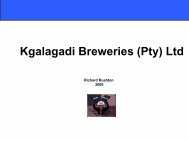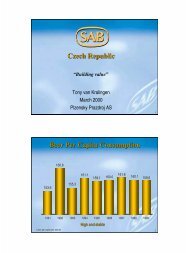Download the Sustainable Development Summary ... - SABMiller
Download the Sustainable Development Summary ... - SABMiller
Download the Sustainable Development Summary ... - SABMiller
You also want an ePaper? Increase the reach of your titles
YUMPU automatically turns print PDFs into web optimized ePapers that Google loves.
10 <strong>SABMiller</strong> plc <strong>Sustainable</strong> <strong>Development</strong> <strong>Summary</strong> Report 2011<br />
Working towards zero waste operations<br />
Seeking ways to eliminate or reuse waste.<br />
Why this is a priority<br />
The majority of waste produced by our business<br />
is organic matter resulting from <strong>the</strong> brewing<br />
process. This includes spent grains, waste yeast<br />
and trub (sediment that appears at <strong>the</strong> bottom of<br />
a fermenter after fermentation has taken place).<br />
The remaining waste comprises damaged<br />
packaging (including broken bottles), kieselghur,<br />
effluent sludge from waste water treatment and<br />
o<strong>the</strong>r non-recyclable waste.<br />
In managing waste generated by our businesses,<br />
we follow <strong>the</strong> principles of <strong>the</strong> waste hierarchy to<br />
reduce, reuse and recycle our waste in an efficient<br />
and, ultimately, value creating way. This requires<br />
us to use our resources efficiently and limit <strong>the</strong><br />
disposal of waste to landfill.<br />
Valuing our waste and making <strong>the</strong> connection<br />
Much of <strong>the</strong> waste we generate has a value and<br />
can be reused. This may be through <strong>the</strong> generation<br />
of energy, by creating new products (recycled<br />
glass bottles from broken glass, for example),<br />
or for agricultural purposes such as fertilisers<br />
or animal feed.<br />
Last year <strong>SABMiller</strong> generated 3.1 million tonnes<br />
of waste, an increase of 0.3 million tonnes<br />
compared to last year, while maintaining <strong>the</strong><br />
recycling rate at 96%.<br />
We encourage all our businesses to operate in<br />
a way that minimises <strong>the</strong> amount of waste sent<br />
to landfill, with <strong>the</strong> ultimate goal that <strong>the</strong>y become<br />
a zero waste operation. Last year, we proved<br />
that this was possible when three MillerCoors<br />
breweries at Elkton, Trenton and Irwindale made<br />
zero waste a reality. The business has maintained<br />
this achievement and has invested in fur<strong>the</strong>r<br />
improvements to <strong>the</strong> way waste is managed.<br />
For example, it has embarked on a programme<br />
to replace all its wooden distribution pallets with<br />
plastics ones that are longer lasting and can be<br />
recycled. They also weigh less and so reduce<br />
energy and emissions during transportation.<br />
In <strong>the</strong> Czech Republic, 99% of all <strong>the</strong> waste<br />
produced by <strong>the</strong> three breweries of Plzeňský<br />
Prazdroj and its 13 sales and distribution centres<br />
was ei<strong>the</strong>r recycled or reused. The vast majority<br />
of waste produced is organic matter, such as spent<br />
grains, which is used for agricultural production in<br />
<strong>the</strong> Czech Republic and Germany. Yeast and malt<br />
waste is used to feed livestock. Sediment from <strong>the</strong><br />
wastewater treatment plant is added to soil as a<br />
fertiliser. Diatomaceous earth, used in filtration,<br />
generates waste that is ploughed into <strong>the</strong> soil in<br />
recultivated areas. In addition, biogas generated<br />
during wastewater treatment is used as an energy<br />
source in breweries in Plzeň, Velké Popovice and<br />
Nošovice, so reducing <strong>the</strong>ir use of fossil fuels.<br />
In 2004 17% of <strong>the</strong> solid waste produced by<br />
Cervecería Nacional in Panama was sent to landfill.<br />
Last year, this figure was less than 1% and <strong>the</strong><br />
business has been able to gain additional income<br />
by selling recyclable materials.<br />
Generating energy from waste<br />
We are increasingly exploring opportunities to use<br />
waste to generate energy, ei<strong>the</strong>r through its direct<br />
combustion or by converting it into biogas or biofuel<br />
to replace fossil fuels. In this way, we are not only<br />
using our waste as a resource, but are also<br />
reducing our dependence on fossil fuels.<br />
In Honduras, we are undertaking an innovative<br />
project to use bagasse – <strong>the</strong> fibrous matter that<br />
remains after sugarcane stalks have been crushed<br />
to extract <strong>the</strong>ir juice – as a biofuel to power <strong>the</strong><br />
Cervecería Hondureña brewery, with surplus<br />
energy delivered to <strong>the</strong> national grid to help satisfy<br />
Honduras’ rising demand for energy. By displacing<br />
some of <strong>the</strong> energy that would o<strong>the</strong>rwise be provided<br />
by fossil fuels, <strong>the</strong> project is saving an estimated<br />
20,000 tonnes of CO 2<br />
e each year.<br />
Go online for more information<br />
www.sabmiller.com/sd<br />
Priority<br />
in action<br />
At our San Juan brewery<br />
in Peru, we are using waste<br />
from <strong>the</strong> production of<br />
Pilsen Callao – one of <strong>the</strong><br />
country’s most popular beers<br />
– to support a substantial<br />
reforestation project in <strong>the</strong><br />
local area, so contributing to<br />
conservation and biodiversity,<br />
and restoring <strong>the</strong> natural<br />
environment for <strong>the</strong> local<br />
community to enjoy.<br />
Brewery waste is treated in<br />
a newly constructed organic<br />
fertiliser plant on site, which<br />
was completed in 2011, and<br />
used to cultivate seedlings<br />
in a nearby nursery garden<br />
before planting. Over five<br />
years, <strong>the</strong> project will reforest<br />
more than 290 hectares and<br />
<strong>the</strong> brewery will seed over<br />
323,000 trees.<br />
Waste produced<br />
(million tonnes)<br />
4.0<br />
Waste recycled or reused<br />
(million tonnes)<br />
4.0<br />
Selected 2012 target<br />
3.0<br />
2.0<br />
2.8<br />
3.3<br />
3.0<br />
2.8<br />
3.1<br />
3.0<br />
2.0<br />
2.7<br />
3.1<br />
2.8<br />
2.7<br />
3.0<br />
Investigate <strong>the</strong> external reuse<br />
options for kieselguhr and ash<br />
in Colombia to prevent <strong>the</strong>m<br />
being sent to landfill.<br />
1.0<br />
0 07 08 09 10 11<br />
1.0<br />
0 07 08 09 10 11<br />
Go online for more 2012<br />
targets for this priority.


